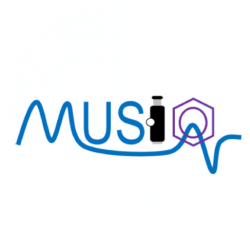Establishing quantitative Stimulated Raman Scattering microscopy workflows for life science research and industrial applications
Supervisor Dr. Tanjef Szellas
Leica Microsystems CMS GmbH
Job Description
Leica Microsystems (Mannheim), in collaboration with Prof. Andreas Zumbusch, University of Konstanz, are pleased to advertise an Early-Stage Researcher (PhD) position to begin in 2019 as part of the Innovative Training Network of the European Commission MUSIQ “Multiphoton Microscopy and Ultrafast Spectroscopy: Imaging meets Quantum”. The position will last three years, and will allow the student to participate in an exciting programme comprising international schools, workshops, and secondments at academic as well as industrial partners.
This project will establish Stimulated Raman Scattering microscopy (SRS) as a quantitative method in life science research (LSR) and industrial chemistry (IC) environments. To this end, the Early-Stage Researcher (ESR) will establish workflows and software algorithms suited for the quantitative determination of local concentrations of specific compounds with high spatial resolution. Different samples with relevance for life sciences research and industrial applications will be evaluated. Applications could include, for example, the discrimination of cell types in multi-cellular model systems, the identification of pathological structures in tissue samples, or a determination of the chemical composition of pharmaceutical compounds.
Specific to MUSIQ, in addition to their individual scientific projects, all ESRs will benefit from further continuing education through a dedicated training program in the various fields of expertise of the consortium partners, which includes secondments, a variety of training modules, transferable skills courses and active participation in workshops, conferences and outreach activities.
As part of the position, the successful candidate will be enrolled in a PhD programme at Konstanz University.
Required skills and qualifications
A masters degree in biology, chemistry, physics, bioinformatics, or a related field is required. The applicant should have a passion for innovative microscopy methods, and their applications in the life sciences or chemical industry, and a strong interest in the development of advanced image analysis procedures and algorithms. The applicant should have a working knowledge of at least one programming language, such as python, matlab, labview, c# or similar.
Eligibility criteria
There are strict eligibility requirements within Marie Skłodowska-Curie Innovative Training Networks. At the time of appointment, applicants:
- MUST at the date of recruitment, be in the first four years (full-time equivalent research experience) of their research careers and have not been awarded a doctoral degree. ‘Date of Recruitment’ means the first day of the employment of the researcher (i.e. contract starting date). ‘Full-Time Equivalent Research Experience’ is measured from the date when the researcher obtained the degree entitling him/her to embark on a doctoral degree programme.
- MUST NOT have resided or carried out their main activity (work, studies, etc.) in the country of the recruiting organisation for more than 12 months in the 3 years immediately before the recruitment date. Compulsory national service, short stays such as holidays, and time spent as part of a procedure for obtaining refugee status under the Geneva Convention1 are not taken into account.
- English language: It is a requirement that network ESRs have an ability to understand and express themselves in both written and spoken English to a level that is sufficiently high for them to derive full benefit from the network training.
Applications are encouraged from all sectors of the community, reflecting the consortium’s commitment to equality and diversity. Female candidates are especially encouraged to apply.
Interested applicants are strongly encouraged to contact Dr. Volker Schweikhard ([email protected]) and Dr. Andreas Zumbusch ([email protected]) as soon as possible.
Additional information
Overview of the project and of the training offered to all Early Stage Researchers of MUSIQ
MUSIQ is an innovative European Training Network (ETN) funded by the European Union’s Horizon 2020 Marie Skłodowska-Curie Actions programme, with the unique vision of developing the next-generation optical microscopy exploiting quantum coherent nonlinear phenomena. ETNs provide training through doctoral research to talented early stage researchers (ESRs). Through 15 ESR research projects, MUSIQ will establish an intersectoral training and research programme at the physics/chemistry/life science interface with partners from 9 European countries. MUSIQ ESRs will enroll in PhD degree programmes and be employed for 36 months in a beneficiary organisation. The consortium brings together a unique team of world-leading academic groups and industry, at the forefront of optical microscopy technology developments merged with fundamental understanding of ultrafast coherent light-matter interaction phenomena, development of quantitative image analysis tools, and biomedical/pharmaceutical real-world applications. MUSIQ aims at creating the next generation of skilled well-connected scientists that will pioneer the ‘quantum microscopes of tomorrow’.
The successful candidates will receive a 36 month, full-time employment contract with a highly competitive salary, as per Marie Skłodowska-Curie Actions (MSCA) regulations for early stage researchers. The monthly salary will be confirmed upon offer, paid in the currency of the host country, and with a correction factor applied to the host country. Researchers may also qualify for a family allowance of €500/month depending on family situation at the time of recruitment. Please visit the EU MSCA website for further information.
The ESRs will be enrolled in a vibrant PhD programme of leading academic and industrial researchers. In addition to their individual scientific projects, all ESRs will benefit from a dedicated training programme (see www.musiq-etn.eu/training) comprising an integrated curriculum of local and intensive network courses, schools, workshops and engagement with cutting-edge research.
Application Process
Please send your application materials to: Dr. Volker Schweikhard ([email protected]) and Dr. Andreas Zumbusch ([email protected]). In addition, please send your CV with a Cover Letter to the Consortium Coordinator email: [email protected]. In the Cover Letter please provide a brief motivation as to why you wish to become an ESR within MUSIQ. All candidates should include a supporting statement to demonstrate how they meet all of the eligibility criteria, and that they possess the required skills and qualifications. Please be aware that your CV may be shared with the named beneficiaries within the consortium, as part of the application review process, to ensure an open, transparent and merit based recruitment. To read the full MUSIQ Data Privacy Notice, please see www.musiq-etn.eu/musiq-data-privacy-notice

